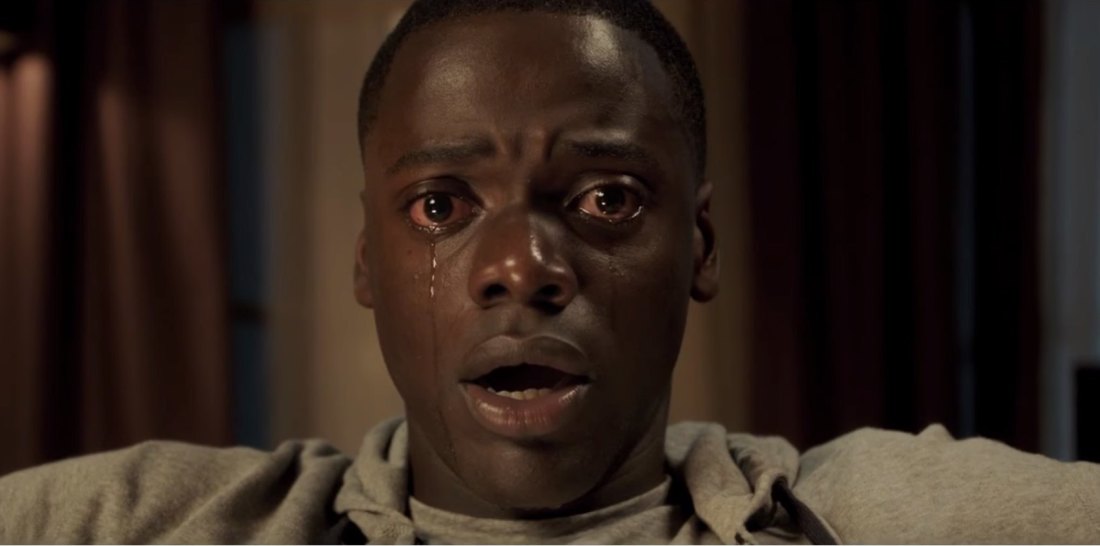Once the hypnosis is introduced, Get Out is clearly going down a specific path, but in these Guess Who's Coming to Dinner-ish scenes and even moreso in the ritzy dinner party that happens the next day, Peele could've simply made a drama of manners about the clashing of classes and races and been on solid ground. There are little touches and microaggressions that step towards intolerability. These might not add up to a horror movie, but in places like the dinner party, there is plenty to be horrified by. Everyone is either nervous around Chris, or too entitled to care about transparently offending him. Each interaction, with its thinly veiled and sometimes overt racism, places the onus on him to shrug off their boorish behavior and be 'one of the good ones.' No nefarious motive is required to believe scenes like these, where a dinner guest talks overly long about Tiger Woods' athletic ability or Jeremy goes too far in an attempt to test out some sociological theory he picked up at school.
However, Peele is making a horror movie alongside his satire, and he's as good at building tension and disconcerting composition as he is at building awkward racial dynamics. He pulls imagery from Under the Skin, another brilliant horror film, to communicate the terrible fate of the Sunken Place, something Missy brings up in her hypnosis session. The framing is deep and dense, with Georgina sometimes looking out a window in the background and sometimes not, but Peele teaches the viewer to look for her. He gets the most out the faces of his actors, a simple and elemental feature that's been with cinema since its inception. Gabriel has a piercing, unblinking stare that she uses to sensational effect. Landry Jones is a reliable shortcut anytime a director wants to communicate that circumstances are slightly off. Kaluuya spends a fair chunk of the film in close-up, particularly the frozen, tear-streaked, Munch-ian face that made up so much of Get Out's marketing. This is a film that earns its intensity not with jump scares but with slowly-increasing oddity and accumulative instances that refuse to be explained away as innocuous.
In the cast, everyone is working together towards that end. Whitford is too welcoming and nice to not be hiding what something. Keener's Svengali character and the key prop Peele gives her to signify her means are a brilliant merging of actor and set design, such that no other alternative, in retrospect, would've worked as well. Williams has never been better as the girlfriend who's just as shocked by all the behavior on display as Chris is, until she very suddenly and definitively is not. Her costuming alone is doing much of the work of the character, and Williams invests it with much more. Stanfield is unstoppable in these small roles, and Stephen Root shows up as a more-approachable dinner party guest, but Kaluuya is the star in a career-making performance. Constantly having to swallow slights and embarrassment, he allows each to register briefly on his face before shrugging each off, over and over again. He communicates how exhausting this must be, to always sublimate yourself to coddle the rude.
Get Out is unimpeachable for the vast majority of its running time, but Peele does some writerly workarounds that stick out in what's otherwise an eternally-relevant piece about white people's love for black bodies but hatred or ambivalence towards black minds. Like 10 Cloverfield Lane, the protagonists have some great sin in their backgrounds, sins that their present circumstances allow the perfect opportunity for atonement. Peele also gets off tone with Chris' friend Rod (Lil Rel Howery), a comic relief character that earns some laughs but also breaks up the tension. Peele has talked about Rod as a way to make his film more crowd-pleasing, an impulse that extends to his ending. There's nothing like Rod in The Witch, another recent and more consistent indie horror film that defies expectations and loses nothing in the sense of doom that pervades it. Peele has undoubtedly earned many chances to top Get Out. I do feel in the minority when it comes to anything but complete and effusive praise for his directorial debut, but Get Out so clearly has the potential for perfection that its flaws stand out all the more. Even with those flaws, it joins indie brethren like The Babadook and It Follows as a smart and effective entry into a genre that is often the opposite. B+

 RSS Feed
RSS Feed